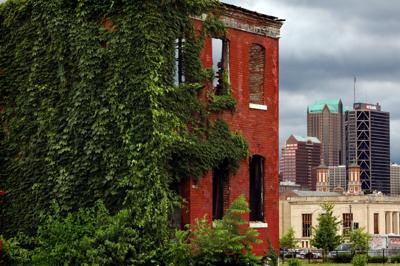
An ivy-covered vacant home at 1604 North 14th Street in Old North looms over downtown ×îÐÂÐÓ°ÉÔ´´ on Tuesday, June 26, 2018. The home is owned by developer Paul McKee’s NorthSide Regeneration.
ST. LOUIS — The city collector’s office has signed off on a deal giving Paul McKee’s NorthSide Regeneration until Dec. 16 to pay over $1 million in late property taxes and associated fees on some 1,000 properties it owns north of downtown.
The deal came after NorthSide’s properties faced possible foreclosure by the city for years of unpaid taxes.
Even in north ×îÐÂÐÓ°ÉÔ´´â€™ deeply depressed real estate market, the few hundred dollars owed on each of NorthSide’s many parcels, combined with interest and fees, added up to a large amount.
NorthSide’s real estate holdings have generated controversy almost since McKee began quietly buying up land north of downtown 20 years ago. The developer and his lawyers argue their land assemblage helped the city land the National Geospatial-Intelligence Agency. Critics say NorthSide has largely neglected its properties and won’t sell except at inflated prices, stymieing other development. Attorneys for the city have pointed to the FBI investigation into the company’s use of state tax credits and a Missouri attorney general lawsuit that accused it of tax credit fraud.
People are also reading…
Judgments involving NorthSide approved by the court last week cover a tax bill of $1.034 million, said Patricia Ortmann, an assistant collector who handles real estate taxes in Collector Greg Daly’s office.
Daly’s office, which annually processes hundreds of city properties with unpaid real estate taxes, generally waits for three years before beginning tax foreclosure proceedings. It’s not uncommon for developers or real estate investors with properties that aren’t producing income to wait until the third year to pay their taxes.
When the city began legal proceedings this spring for next year’s tax sales, it marked the first time NorthSide was sued by the city for back taxes. Daly’s office has said it does not enter into repayment plans with commercial property owners, though owners have up to the day of the tax auction to pay bills.
The deal was necessitated by some unusual legal maneuvers from McKee’s lawyers. Most tax foreclosure lawsuits involve vacant property, so the owners don’t usually respond in court. But McKee’s lawyers filed responses for each parcel of land, which must be individually sued for back taxes, contesting whether the collector’s office had followed state tax foreclosure law. That would have necessitated hundreds of court hearings, a practically impossible task.
Jack Garvey, a lawyer for the collector’s office, said last month the NorthSide properties had been removed from the tax sale list to avoid that procedural issue and that a deal had been reached to have the landowner pay by December or have foreclosure resume. They would still be on one of next year’s tax sales if NorthSide couldn’t pay by December, Garvey said then.
Ortmann echoed that Wednesday, saying NorthSide’s properties will still end up on one of next year’s tax sales if it doesn’t pay the $1 million by December.
Asked if NorthSide could pay the back taxes, Joe Dulle, a lawyer for McKee, said Thursday that NorthSide plans to abide by the terms of the agreement.
View life in ×îÐÂÐÓ°ÉÔ´´ through the Post-Dispatch photographers' lenses. Edited by Jenna Jones.

















